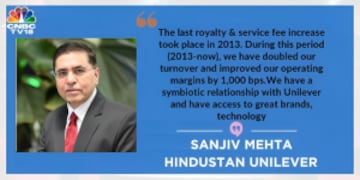
The Board of Directors of Hindustan Unilever Limited (HUL) on January 19, 2023 approved the proposal to raise royalty payment to Uniliver UK, the parent company of the Indian firm by a hefty 80 percent in three phases starting 1st February 2023. Under the new agreement, the royalty and central services fees will increase from 2.65 percent (FY22) to 3.45 percent of turnover -- 45 bps increase in effective cost-- for February to December 2023, 25 bps increase in effective cost for calendar year 2024, and 10 bps increase in effective cost from January 2025.
The issue of royalty to parents bristles with sensitive issues. Can a parent charge tuition fees from her own child? Before 2009, royalty payment was regulated by the government and capped at 8 percent of exports and 5 percent domestic sales in the case of technology transfer collaborations and was fixed at 2 percent of exports and 1 percent of domestic sales for use of trademark and brand name.

With the removal of these caps, foreign companies were emboldened to hike their royalties from their Indian partners substantially. Auto major Maruti Suzuki pays an average royalty of around 5.5 percent of its turnover to its Japanese parent Suzuki in addition to importing vital components like gear box from the latter.
Also Read:
In 2017-18, 27 multinational companies (MNCs) paid an aggregate Rs 6,737 crore in royalties, more than half of which was accounted by Maruti Suzuki India Ltd at Rs 3,818 crore, or 25.8 percent of profits before tax, These royalty payment accounts for 16 percent of these 27 MNCs' pre-tax pre-royalty profits and almost 27 percent of their aggregate Rs 25,040 core profit after tax.
Maruti Suzuki India Ltd, GE T&D India Ltd, 3M India Ltd, and Johnson Control-Hitachi Air Condition India Ltd have paid more than 20 percent of their pre-tax, pre- royalty profits as royalty to their respective parent companies. Fourteen of the 27 MNCs (whose recent financial statements were available) paid over 2 percent of net sales as royalty to their parent companies
In 2017, the government appointed a committee to examine the ramifications of the liberal royalty policy but its findings are yet to see the light of the day. Meanwhile the SEBI in June 2019 sought to impose its own restrictions on listed companies----cap on royalty at 2 percent of the turnover---but one is sceptical of such restrictions being capable of being enforced coming as they do from the market regulator and not by law.
The reason for the marked preference in favour of royalty by foreign parents is not far to seek. It is royalty-dividend tax arbitrage. In India, royalty is taxed at the rate of 10 percent in the hands of foreign companies whereas dividend from their babies in India are taxed at 40 percent. Naturally, dividends are sought to be camouflaged. So, the government must move in vide the budget 2023 to plug this loophole.
Any arbitrage opportunity is bound to be exploited. Perhaps the soft 10 percent tax on royalties should be reserved for technology agreements that bring in state-of-the-art or cutting-edge technology approved by a high-powered committee comprising experts and endowed with unimpeachable integrity.
The government must also review the 2009 change which almost amounted to laissez faire in favour of foreign companies. Apart from tantalising them to take a lion’s share of their dividend entitlement as royalty in view of the low tax on it, it also denudes the Indian shareholders of dividend to that extent. Besides, the dangers of over-invoicing and kickbacks are too well-known to be elaborated.
Crooked Indian promoters can pay a generous royalty to their foreign collaborators only to get a hefty kickback in secretive bank accounts abroad. Perhaps it is time to act on Murli Manohar Joshi’s famous quip----computer chips yes, potato chips no.
He was referring to welcoming foreign technology selectively so that the domestic industry which has the requisite technology is encouraged and there was no needless outgo of precious foreign exchange towards royalty.
The issue that needs to be specifically addressed is fleecing its Indian subsidiary by the foreign parent. Incidentally both HUL and Maruti Suzuki belong to this genre. A clampdown on any royalty to a 51 percent parent perhaps may be justified.
The author, S Murlidharan, is a CA by qualification, and writes on economic issues, fiscal and commercial laws. The views expressed in the article are personal.
Read his previous articles here
(Edited by : C H Unnikrishnan)
First Published: Jan 23, 2023 4:33 PM IST
Check out our in-depth Market Coverage, Business News & get real-time Stock Market Updates on CNBC-TV18. Also, Watch our channels CNBC-TV18, CNBC Awaaz and CNBC Bajar Live on-the-go!


Lok Sabha elections 2024: BJP's bid for breakthrough in Kerala is an uphill battle, say experts
Apr 23, 2024 9:53 PM
2024 Lok Sabha Elections | PM's Rajasthan speech — has it anything to do with the post-poll mood of the first phase
Apr 23, 2024 3:45 PM
It's KGF 2024 and here's a look at the key characters in Karnataka
Apr 23, 2024 3:17 PM
JP Morgan: Nifty may test 25,000 if BJP wins in 2024 Lok Sabha elections
Apr 23, 2024 2:23 PM

